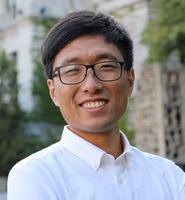Transmission Neural Networks: From Virus Spread Models to Neural Networks

Abstract: This work connects models for virus spread on networks with their equivalent neural network representations. Based on this connection, we propose a new neural network architecture, called Transmission Neural Networks (TransNNs), where activation functions are primarily associated with links and are allowed to have different activation levels. This connection also leads to the discovery and the derivation of three new activation functions with tunable or trainable parameters. We show that TransNNs with a single hidden layer and a fixed non-zero bias term are universal function approximators. Moreover, we establish threshold conditions for virus spread on networks where the dynamics are characterized by TransNNs. Finally, we present new fundamental derivations of continuous time epidemic models on networks based on TransNNs.
Biography: Shuang Gao received his PhD degree in Electrical Engineering from ∆ªπ˚“˘‘∫ under the supervision of Peter E. Caines. He was a postdoctoral researcher at ∆ªπ˚“˘‘∫ from 2019 to 2022. He is currently a research fellow at the Simons Institute for the Theory of Computing at the University of California, Berkeley. His research aims to discover fundamental properties of dynamics and control of systems that involve large populations of network-coupled agents or subsystems, and achieve intelligent decision-making for such systems. His research interests lie in control, games and learning for large networks (including those modeled by graphons), along with applications in social networks, epidemic networks, smart renewable energy grid and biological neural networks.

